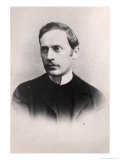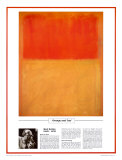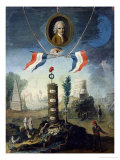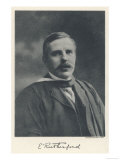|
|
|
Sir Ken Robinson
b. 3-4-1950; Liverpool, England
Ken Robinson, an international leader in innovation and human resources, was a Professor of Arts Education.
Ken Robinson quotes ~
• “My contention is that creativity now is as important in education as literacy, and we should treat it with the same status.”
• “If you're not prepared to be wrong, you'll never come up with anything original. People are being educated out of their creative capacity. We do not grow into creativity, we grow out of it. As far as education for children, we need to educate their whole being. Picasso said “All children are born artists.” How do we remain artists as we grow up?”
• “I define creativity as the process of having original ideas that have value.”
• “Our best hope for the future is to develop a new paradigm of human capacity to meet a new era of human existence.”
|
|
|
|
Fred McFeely Rogers
b. 3-20-1928; Latrobe, PA
d. 2-27-2003; Pittsburgh
Educator, Presbyterian minister, songwriter, author, and television host Fred Rogers was most famous for creating and hosting Mister Rogers' Neighborhood (1968–2001).
Fred Rogers quote ~
• “Anyone who does anything to help a child in his life is a hero to me.”
|
|
|
|
Romain Rolland
b. 1-29-1866; Clamecy, Nièvre, France
d. 11-30-1944
A professor of history and music, Romain Rolland, better remembered as a dramatist, novelist, essayist, art historian and mystic, was awarded the 1915 Nobel Prize for Literature “as a tribute to the lofty idealism of his literary production and to the sympathy and love of truth with which he has described different types of human beings.”
FYI - Rolland was the first to bring the work of Mahatma Gandhi to the public attention; the author Hermann Hesse dedicated his novel Siddhartha to Rolland.
Romain Rolland quotes ~
• “One makes mistakes; that is life. But it is never a mistake to have loved.”
• “The greatest book is not the one whose message engraves itself on the brain, but the one whose vital impact opens up other viewpoints, and from writer to reader spreads the fire that is fed by various essences, until it becomes a great conflagration.”
• “Skepticism, riddling the faith of yesterday, prepared the way for the faith of tomorrow.”
• “I find war detestable but those who praise it without participating in it even more so.”
• “A hero is a man who does what he can.”
• “It is the artist's business to create sunshine when the sun fails.”
• “The people have been gradually conquered by the bourgeois class, penetrated by their thoughts and now want only to resemble them. If you long for a people's art, begin by creating a people!”
• “All these young millionaires were anarchists, of course: when a man possesses everything it is the supreme luxury for him to deny society: for in that way he can evade his responsibilities.”
• Jean-Chritophe by Romain Roland
|
|
|
|
Theodore Roszak
b. 11-15-1933; Chicago, Illinois
d. 7-5-2011; Berkeley, CA
Historian and professor Theodore Roszak is best remembered for his 1968 The Making of a Counter Culture, which explored the European and North American counterculture of the 1960s and technocracy.
Technocracy, a word derived from the Greek tekhne = skill and kratos = power, describes a form of government in which engineers, scientists, health professionals and other technical experts, control decision making in their respective fields.
FYI - democracy: rule by the people; oligarchy: rule by a small number of people; plutocracy, rule by wealth; theocracy: rule by clergy; monarchy = rule by one / aristrocracy = rule by elites.
Theodore Roszak quotes ~
• “Technology has destroyed interrelations in the human community. ... We are living among dispirited and agonized teenagers who can't find any hope.”
• “Nature composes some of her lovliest poems for the microscope and the telescope.”
• “It may, after all, be the bad habit of creative talents to invest themselves in pathological extremes that yield remarkable insights but no durable way of life for those who cannot translate their psychic wounds into significant art or thought.”
• “It should be obvious that action without wisdom, without clear awareness of the world as it really is, can never improve anything.”
|
|
|
|
Mark Rothko
(neé Marcus Rothkowitz)
b. 9-25-1903; Riga, Latvia
d. 2-25-1970; NY, suicide
Abstract Expressionist painter Mark Rothko needed to supplement his income early in his career so he gave classes in painting and clay sculpture between 1929 and 1952.
Mark Rothko quotes ~
• “It is a widely accepted notion among painters that it does not matter what one paints as long as it is well painted. This is the essence of academicism. There is no such thing as good painting about nothing. We assert that the subject is crucial and only that subject matter is valid which is tragic and timeless. That is why we profess spiritual kinship with primitive and archaic art.” Letter to the New York Times from Mark Rothko, Adolph Gottlieb, and Barrett Newman; June 13, 1943
• “I am not an abstract painter. I am not interested in the relationship between form and color. The only thing I care about is the expression of man's basic emotions: tragedy, ecstasy, destiny.”
• “Certain people always say we should go back to nature. I notice they never say we should go forward to nature.”
• more 20th Century Art Masterpieces Educational posters
|
|
|
|
Jean-Jacques Rousseau
b. 6-28-1712; Geneva, Switzerland
d. 7-2-1778; Ermenonville, Kingdom of France
Jean-Jacques Rousseau, philosopher, author and composer, based his philosophical works of the principle of the natural goodness of humanity, the corrupting influence of civilization and society, and influenced the American and French Revolutions.
Rousseau believed individual liberty was crushed by division of labor and called for a social contract investing power in governing structures.
The modern subjective autobiographical genre was initiated in Rousseau's Confessions and is reflected in the work of thinkers from Hegel and Freud; his fictional work was among the most popular novels of the eighteenth century and was important to the evolution of Romanticism. Rousseau has been buried in Paris Pantheon since 1794.
Rousseau's novel Emile: or, On Education, describes the stages of child development with his conception of the evolution of culture.
Jean-Jacques Rousseau quotes:
• “The noblest work in education is to make a reasoning man, and we expect to train a young child by making him reason! This beginning at the end; this is making an instrument of a result. If children understood how to reason they would not need to be educated.”
• “We are born weak, we need strength; helpless, we need aid; foolish, we need reason. All that we lack at birth, all that we need when we come to man's estate, is the gift of education.”
• “The training of children is a profession, where we must know how to waste time in order to save it.”
• “I hate books; they only teach us to talk about things we know nothing about.”
• “Those that are most slow in making a promise are the most faithful in the performance of it.”
• “Men, be kind to your fellow-men; this is your first duty, kind to every age and station, kind to all that is not foreign to humanity. What wisdom can you find that is greater than kindness?”
• The Social Contract, Jean-Jacques Rousseau
|
|
|
|
J. K. Rowling
b. 7-31-1965; Yate, Gloucestershire, England
J. K. Rowling, the author of the Harry Potter books, taught English as a second language.
J. K. Rowling quotes ~
• “I just write what I wanted to write. I write what amuses me. It's totally for myself.”
• “It takes a great deal of courage to stand up to your enemies, but even more to stand up to your friends.”
• “Jane Austen is the pinnacle to which all other authors aspire.”
|
|
|
|
Ernest Rutherford
b. 8-30-1871; Brightwater, New Zealand
d. 10-19-1937; Cambridge, England
Ernest Rutherford is known as the “Father of Nuclear Physics”. Among his notable students were Niels Bohr and numerous Nobel Prize winners. Rutherford was awarded the 1908 Nobel Prize in Chemistry “for his investigations into the disintegration of the elements, and the chemistry of radioactive substances”.
Ernest Rutherford quotes ~
• “If your experiment needs statistics, you ought to have done a better experiment.”
• “We haven't got the money, so we've got to think!”
• Ernest Rutherford: Father of Nuclear Science (Grades 6 up)
|
|
|












